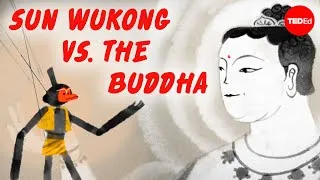請雙擊下方英文字幕播放視頻。
譯者: Lilian Chiu
審譯者: Amanda Zhu
00:07
It was June 2010.
0
7086
2294
時間是 2010 年 6 月。
00:09
Inside the Scripps National Spelling Bee,
1
9464
2544
在全美拼字比賽中,
00:12
contestants between 8- and 15-years-old
wrestled words
2
12008
3879
八歲到十五歲的參賽者
00:15
like brachydactylous and leguleian.
3
15887
3587
努力地拼出像 brachydactylous
和 leguleian 等字。
00:20
Outside, a crowd protested the complexity
of English spelling conventions.
4
20058
5422
場外則有一群人在抗議
英語拼寫規則太過複雜。
00:25
Indeed, spelling reformers have
been around for centuries,
5
25772
3211
的確,拼字改革者
數個世紀前就存在了,
00:28
advocating for overarching changes to make
English spelling more intuitive.
6
28983
4880
他們倡導讓英語拼字更直觀的
全面性的改變,
00:34
The English language is chock-full
of irregularities.
7
34113
3587
英語充滿了不規則性。
00:37
One commonly used example of this:
take the “g-h” sound from “enough,”
8
37950
5548
一個常用的例子是:
「enough」(足夠)中的「gh」
發成「f」的聲音,
00:43
the “o” sound from “women,”
and the “t-i” sound from “action,”
9
43664
5631
「women(女人)」中的「o」
發成「i」的短音,
以及「action(行動)」
中的「ti」發成「sh」的聲音,
00:49
and you could argue that
“g-h-o-t-i” spells “fish.”
10
49378
5214
那麼是不是可以說「g-h-o-t-i」
拼出的是「魚(fish)」?
00:54
So, how did English get like this?
11
54926
2878
所以,英語怎麼會變成這樣的?
00:59
English arose from old Germanic
tribes that invaded the British Isles
12
59514
4296
英語源於古日耳曼部落,
這些部落在一千五百多年前
入侵不列顛群島。
01:03
more than 1,500 years ago.
13
63810
2919
01:06
Their languages coalesced and evolved
into Old English.
14
66979
4421
他們的語言融合並演化成古英語。
01:12
When Roman missionaries arrived
around 600 CE,
15
72485
3629
羅馬傳教士在西元
六百年左右抵達時,
01:16
they devised ways to write it
down using the Latin alphabet,
16
76114
3920
他們想辦法用拉丁字母
把英語寫下來,
01:20
supplementing it with some Germanic runes
for sounds they didn’t have letters for.
17
80118
5046
拉丁字母無法對應的聲音
就用日耳曼盧恩符文來補充。
01:25
Then came the Norman invasion of 1066
when French speakers conquered England.
18
85581
6006
接著,1066 年諾曼人入侵英格蘭,
他們說的是法語。
01:31
French became the language
of authority and high society.
19
91796
3754
法語成為官方和上流社會的語言。
01:35
But English remained the dominant
spoken language.
20
95633
3670
但英語仍然是主要的口語。
01:39
Over time, those descended from French
speakers also became English speakers,
21
99554
4921
漸漸地,說法語者的後裔
也都改說英語了,
01:44
but some French words snuck
into the language.
22
104517
2919
但有一些法語字滲透進英語裡。
01:47
Some English speakers were also familiar
with Latin through the church
23
107812
3837
透過教堂和正式教育,
一些說英語的人對拉丁語也不陌生。
01:51
and formal education.
24
111649
1376
01:53
By the mid-1400s, people were writing
in English again—
25
113442
3754
到了十五世紀中期,
大家又再次用英語書寫,
01:57
but it was unstandardized.
26
117363
2002
但並沒有標準化。
01:59
They used a mix of influences to determine
word choice and spelling,
27
119615
4171
字詞的用法及拼寫方式
受到多種語言的影響,
02:03
including the French they knew,
the Latin they studied,
28
123911
2962
像是他們了解的法語、
學習過的拉丁語,
02:06
and the English they spoke.
29
126873
1751
和他們平日說的英語。
02:09
So, things were already pretty messy.
30
129041
3379
所以,狀況已經很混亂了。
02:12
Then, in 1476, the printing press
arrived in England.
31
132503
4922
接著,1476 年,
印刷機引入英格蘭。
02:17
Some of the people working the presses
may have mainly spoken Flemish—
32
137675
4087
一些操作印刷機的人
說的可能是法蘭德斯語——
02:21
not English.
33
141804
1043
不是英語。
02:22
And they were given manuscripts
that varied widely in their spelling.
34
142889
3920
他們拿到的手稿
在拼字上的變化很大。
02:27
Without standardization, different writers
went with various spellings
35
147185
4295
在沒有標準化的情況下,
不同作家的拼字方式不同,
02:31
based in part on what they happened
to encounter while reading.
36
151480
3963
他們的拼字有時候是
根據接觸過讀物。
02:35
Many words had a multitude of spellings.
37
155818
3045
許多字都有多種拼法。
02:38
The word “dough,” for instance,
38
158946
2294
以「dough(麵團)」為例,
02:41
used to be spelled in all these ways
and was originally pronounced “dach.”
39
161282
5547
曾經拼寫成 dogh、daghe、dowhe、
dou、daugh、deaugh、deig,
且它最初的發音為「dach」。
02:46
The guttural Germanic sound it ended with
was one the Latin alphabet didn’t cover.
40
166954
5631
字尾的日耳曼語喉音
無法用拉丁字母表達,
02:52
It eventually came to be
represented with “g-h.”
41
172752
3545
最終,大家漸漸用「gh」來代表它。
02:56
But, for some “g-h” words,
42
176339
2002
但碰到有些含「gh」的字,
02:58
English speakers eventually dropped
the guttural sound altogether;
43
178341
3962
說英語的人最後乾脆
不發這個喉音了;
03:02
for others, they ended up pronouncing
it as “f” instead,
44
182345
3795
至於其他字,他們
改用「f」的發音來取代,
03:06
as exemplified in “dough” versus “tough.”
45
186265
3671
就像「dough(麵團)」的
「gh」不發音,
但「tough(困難)」的「gh」
發成「f」的聲音。
03:10
Printing presses memorialized
the spelling
46
190186
2461
印刷讓這種拼法留下來,
03:12
even though the pronunciation
eventually changed.
47
192647
3461
即使發音已經改掉了。
03:16
And this wasn’t just the case with “g-h.”
48
196108
2503
而「gh」不是唯一的例子。
03:18
Some letters in other words
also fell silent:
49
198778
2919
其他字也有一些不發音的字母:
03:21
words like knife, gnat, and wrong
50
201822
3421
比如「knife(刀)」的「k」、
「gant(蚋)」的「g」,
和「wrong(錯)」的「w」
03:25
all contain the vestiges
of past pronunciations.
51
205409
3754
都有著過往發音的痕跡。
03:29
But while the printing press
was solidifying spellings,
52
209538
3462
但在印刷機讓拼法固定下來的同時,
03:33
the English language was also undergoing
what scholars call the Great Vowel Shift.
53
213000
6090
英語也在經歷學者所謂的
「母音大轉變」。
03:39
Between the 14th and 18th centuries,
54
219507
2502
在十四到十八世紀間,
03:42
the way English speakers pronounced
many vowels changed significantly.
55
222009
4672
英語中許多母音的發音方式
有顯著的改變。
03:46
For instance, “bawt” became “boat.”
56
226847
3379
例如,船的發音
從「bawt」變成「boat」。
03:50
This displaced the word for “boot,”
57
230226
2335
這個發音取代掉「靴子(boot)」
這個字的發音,
03:52
which had up until then
been pronounced “boat,”
58
232645
3420
在那時之前,「靴子」的發音
跟現在的「船(boat)」是一樣的,
03:56
and pushed it into the high “u” vowel
position it maintains today.
59
236065
4379
之後它的母音改用高舌位的「u」,
一直持續到今天。
04:00
Words that already had this high “u”
often became diphthongs,
60
240695
4254
已經有高舌位「u」的字
通常變為雙母音,
04:04
with two vowels in a single syllable.
61
244949
2419
也就是在單一音節中有兩個母音。
04:07
So, “hus” became “house.”
62
247451
3087
所以,「hus」變成了
「house(房子)」。
04:10
As with so many linguistic matters,
there's no clear reason why this happened.
63
250538
5046
和許多語言問題一樣,
這種轉變沒有明確的原因,
但確實就是發生了。
04:15
But it did.
64
255584
1085
04:17
And how the vowel shift affected a word
depended on various things,
65
257044
5089
母音轉變對字的影響,
取決於好幾個因素,
04:22
including the other sounds in the word.
66
262133
2544
像是該字中的其他音。
04:25
The word “tough” was once “tōh,”
among other variations.
67
265177
4839
「tough(困難)」過去
有多種發音,其一是「tōh」。
04:30
“Through” was once “thruch”
and “dough” “dah.”
68
270182
4672
「through(穿過)」
曾經被發成「thruch」、
「dough」和「dah」。
04:35
These words all started
with different vowel sounds
69
275271
3045
這些字最初的母音皆不同,
04:38
that were then affected differently
by the vowel shift.
70
278316
4212
接著受到不同的母音轉變影響。
04:42
The “o-u” spelling they all adopted was
a haphazardly applied French influence.
71
282695
5964
它們都有的「ou」是受法語影響,
但並沒有特別的規則可言。
04:48
So, eventually they wound up with
still distinct vowel sounds,
72
288784
4713
因此,最後拼法類似
但母音發音還是不同,
04:53
but similar spellings
that don’t really make much sense.
73
293497
3671
一點道理也沒有。
[管理階層對於在此機器中遺失
或變形的母音不負任何責任]
04:57
All this means English can be
a difficult language
74
297668
3420
所以對於非英語母語者而言,
英語可能很難學,
05:01
for non-native speakers to learn.
75
301088
2044
05:03
And it reveals the many ways history,
in all its messiness,
76
303299
4046
同時也展示了歷史在混亂當中
以許多方式影響了英語,
05:07
acted upon English,
making it especially tough.
77
307386
4254
讓英語變得特別困難(tough)。
New videos
關於本網站
本網站將向您介紹對學習英語有用的 YouTube 視頻。 您將看到來自世界各地的一流教師教授的英語課程。 雙擊每個視頻頁面上顯示的英文字幕,從那裡播放視頻。 字幕與視頻播放同步滾動。 如果您有任何意見或要求,請使用此聯繫表與我們聯繫。







